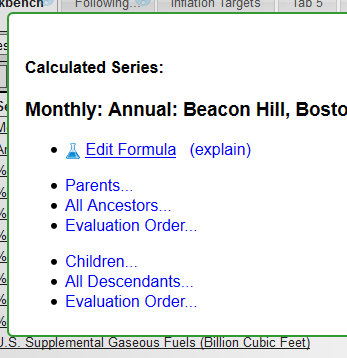Difference between revisions of "About Series"
| Line 33: | Line 33: | ||
===<b><i>Calculated</i></b>=== | ===<b><i>Calculated</i></b>=== | ||
<div> | <div> | ||
| − | A calculated series is the result of a dataZoa [[About_the_ComputeCloud|ComputeCloud]] formula. dataZoa updates these automatically by keeping track of their {{: | + | A calculated series is the result of a dataZoa [[About_the_ComputeCloud|ComputeCloud]] formula. dataZoa updates these automatically by keeping track of their {{:Calculated_Series#Ancestors|ancestors}}. |
</div> | </div> | ||
Revision as of 08:00, 30 January 2017
Series are the fundamental data type throughout dataZoa. They may also be referred to as time series or data series.
Contents
Common Features
All Series are a set of numbers, ordered in time, representing some phenomenon at various points in time.
As such, they share some common features:
- A Title, like Rainfall
- A Frequency, like Weekly
- Units of measurement, like millimeters
- and potentially many others, like footnotes, synonyms, etc.
To keep things orderly, every dataZoa series also has:
- A dataZoa Series Key - a unique identifier like MyAccount/00004328
- Privacy controls - Public/Private/Selectively Shared
Types of Series
Depending on where they originate, series are classed into different "types", with appropriate implications:
Live or auto-updating
These come from other sites around the Web via the dZ-Dot, and dataZoa remembers where they originate, updating them for you as the sources change.
Uploaded
Series you load in from your own files (or even just copy and paste). As such, you are responsible for keeping them up to date.
Calculated
|
In the workbench, use the Formula icon next to the title of a calculated series to pop up these Calculated Series Attributes:
|
|
| Click on the blue links in this panel to drill-down for further attribute details. |
Formula
The formula atribute is simply the math expression that defines the series. You can edit the formula from this link.
Parents
Parents refers to the series that are direct inputs to the formula. Parents may be calculated series themselves or simply ordinary series.
When you click on the word Parents the titles of all the formula's parent series are listed. Clicking on any of those titles shows deeper information about that parent, such as its series key, owner, sharing status, and lists its parents and children, if any.
All Ancestors
Ancestors refers to the series that are direct or indirect inputs to the formula.
Ancestors' Order of Evaluation
This list may be useful in troubleshooting complex inter-dependencies.
Children
Children refers to the series that use this series as a direct input to their own formula. Children are by definition calculated series themselves.
When you click on the word Children, the titles of all the formula's child series are listed. Clicking on any of those titles shows deeper information about that child, such as its series key, owner, sharing status, and lists its parents and children, if any.
All Descendants
Descendants refers to all series that depend in any way on this series.
Descendants' Order of Evaluation
This list may be useful in troubleshooting complex inter-dependencies.
Circular References
A circular reference is a formula that uses any of its descendants as an ancestor, which is an error.
When a circular reference is discovered as the formula is being created, it is flagged and rejected immediately. More subtly, a formula can become circular after it is created. When this happens, the result series from the formula is invalidated and marked with an error message in the series title.
Broken References
A broken reference is a formula where one or more ancestors becomes unavailable. This can happen when the ancestor is deleted, invalid, or relies on shared data whose access has been revoked.
When a broken reference is encountered, the result series from the formula is invalidated and marked with an error message in the series title.
In the case where the break is due to a shared series with a revoked permission , the result series has a special title, Removed by Owner (RBO) so that the problem can be corrected by examining the ancestors and restoring permissions.
Contributed
These are series that you set up initially using dZSlates, but new values are entered by others, from outside your account.


